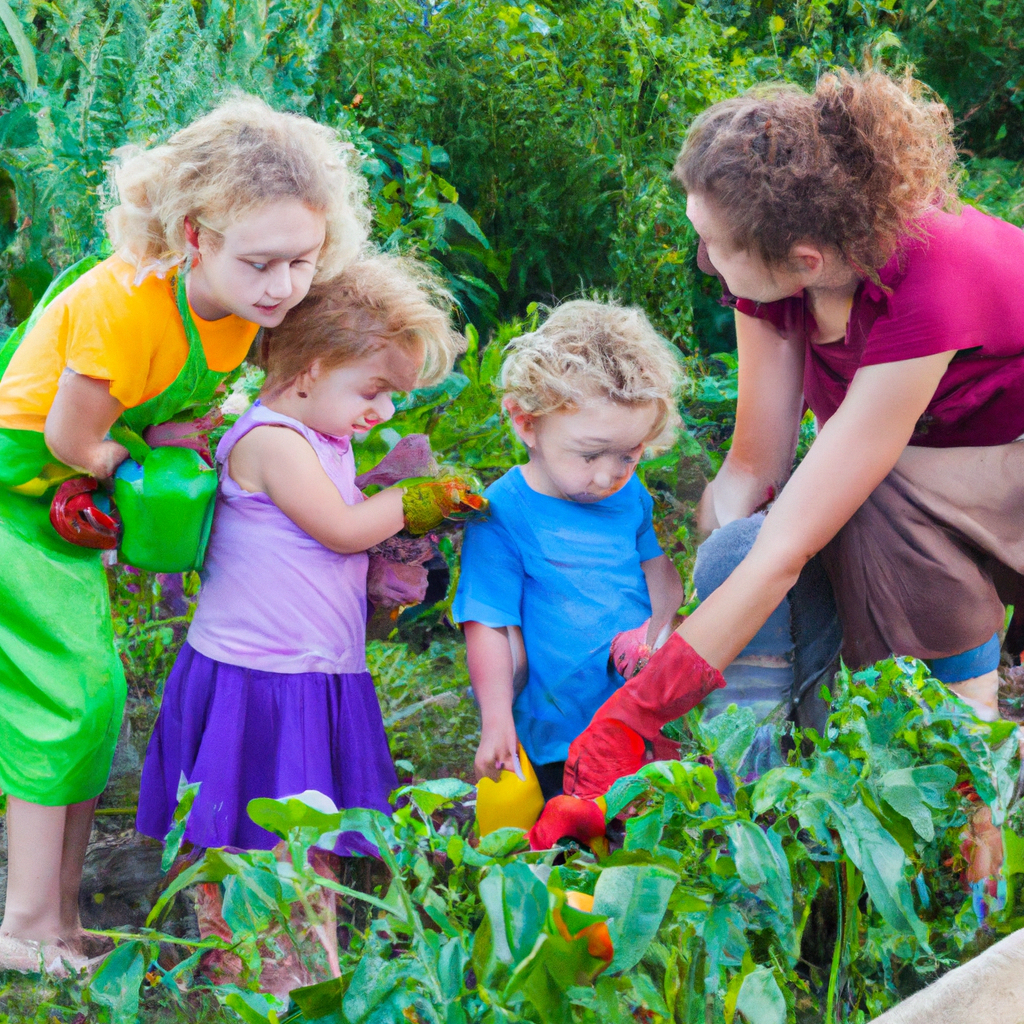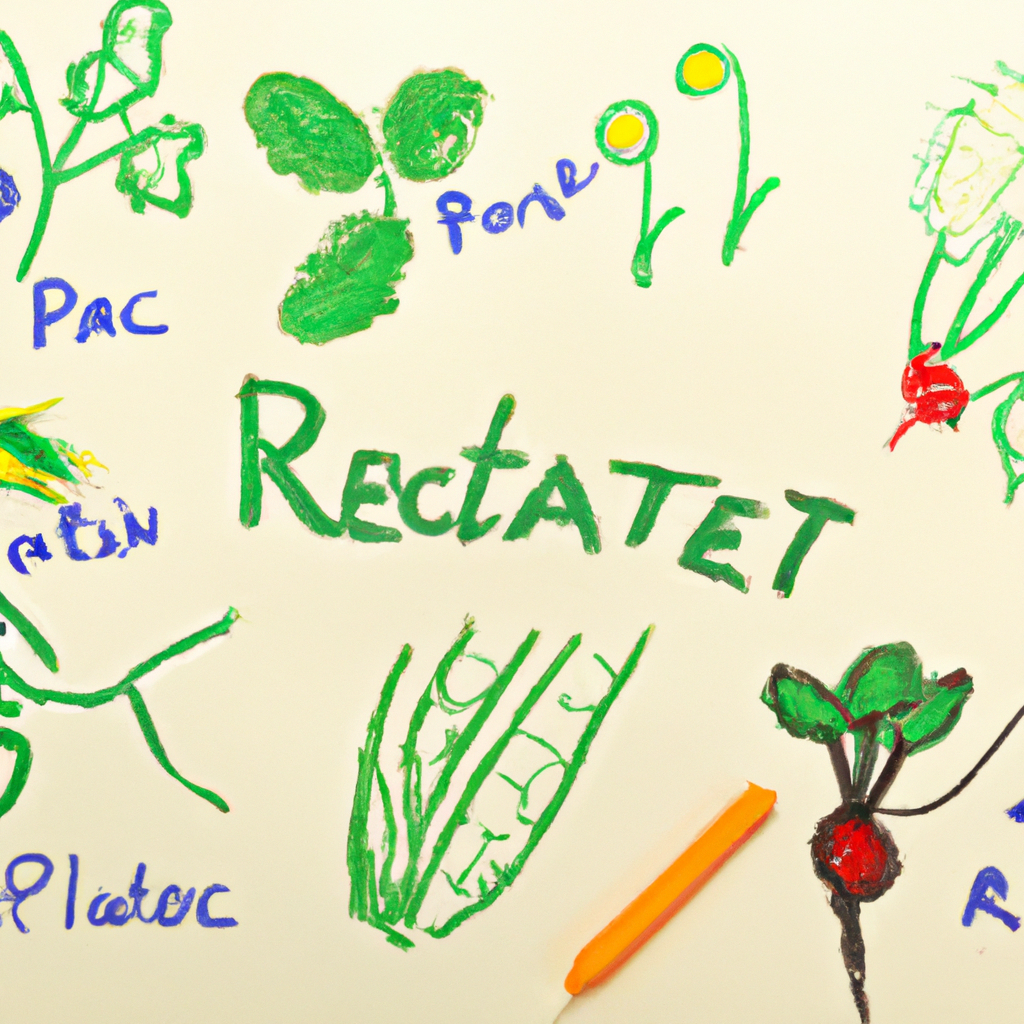Step into the magical world of gardening with your little ones and watch as they cultivate their curiosity and grow their very own healthy produce. Gardening with kids not only provides a hands-on learning experience but also ignites a sense of wonder and responsibility within them. Explore this enchanting journey together, as we delve into the hidden treasures that cultivating a green thumb can unearth. Harness the power of nature and watch as your little sprouts blossom into nature-loving adventurers, nurturing not only their own harvest but also a lifelong connection to the natural world. Join us as we unveil the secrets to gardening with kids and discover the bountiful rewards that lie within the soil.
1. Sprouting Green Thumbs: Igniting a Passion for Gardening in Children
Gardening is not only a therapeutic and rewarding hobby for adults, but it can also be a fantastic way to ignite a passion for nature in children. Sprouting green thumbs at a young age allows children to develop a deep appreciation for the environment, understand the importance of sustainability, and cultivate a connection with their surroundings.
Getting kids excited about gardening may seem daunting at first, but with some creativity and a little bit of patience, you can easily engage them in this wonderful activity. Here are a few tips to help you nurture their interest and foster their love for gardening:
- Start small: Begin by introducing your children to small plants or herbs that are easy to grow, such as cherry tomatoes or basil. Allowing them to see the results of their efforts will immediately boost their confidence and enthusiasm.
- Create a kid-friendly garden: Dedicate a section of your outdoor space specifically for your children’s gardening endeavors. Use colorful and playful elements like stepping stones, mini garden tools, and whimsical ornaments to make it more appealing and inviting.
- Make it educational: Use gardening as a way to teach children about biology, ecology, and the natural life cycle of plants. Explain how different species attract pollinators, how to care for the soil, and how plants play a vital role in our overall ecosystem.
- Encourage exploration: Allow your little ones to get their hands dirty and explore the garden freely. Let them feel the soil, observe insects, and discover the wonders of the natural world firsthand. This experiential learning will help them develop a genuine connection to nature.
- Involve them in decision-making: Empower your children by involving them in the planning and decision-making process of the garden. Let them choose the flowers, vegetables, or herbs they would like to grow. This sense of ownership will make gardening a truly enjoyable and personal experience for them.
So, don’t hesitate to pass on your love for gardening to the next generation. With a little guidance, patience, and a sprinkle of imagination, you can help ignite a passion for gardening in your children, nurturing their green thumbs and fostering a deep appreciation for the beauty of nature.
2. From Soil to Table: Fostering Healthy Habits Through Growing Your Own Produce
Imagine the joy of nurturing a tiny seedling, watching it grow into a flourishing plant, plucking fresh vegetables from your own backyard, and finally savoring the taste of your hard-earned produce on your plate. When you grow your own food, you not only gain a deeper appreciation for the process of food production but also cultivate valuable healthy habits that positively impact your well-being.
In today’s fast-paced and convenience-driven society, reconnecting with nature through gardening can be a nourishing experience for both body and mind. Here are several compelling reasons why growing your own produce can foster healthy habits:
- Increased Nutritional Value: When you grow your own fruits and vegetables, you have complete control over the cultivation methods, ensuring that no harmful chemicals or pesticides are used. This results in produce that is not only fresher and tastier but also packed with higher nutritional content.
- Enhanced Emotional Well-being: Gardening offers immense mental and emotional benefits. Engaging with nature, witnessing the growth cycle, and nurturing plants release endorphins, promoting relaxation and reducing stress. Moreover, the satisfaction of harvesting your own crops boosts self-esteem, instilling a sense of accomplishment and purpose.
- Physical Activity: Maintaining a garden involves various physical tasks like digging, planting, weeding, and harvesting. These activities provide a great opportunity to stay active, burn calories, and build strength. Gardening can be a wonderful form of exercise for people of all ages and abilities.
- Financial Savings: Growing your own produce can significantly reduce your grocery bills. By investing time and effort in cultivating your own food, you can enjoy a bountiful harvest at a fraction of the cost compared to buying organic produce from the market. It’s a practical way to save money while ensuring the supply of fresh, pesticide-free food for your family.
So, whether you have a spacious garden, a small balcony, or even a sunny windowsill, growing your own produce can be a transformative journey. Not only will you develop healthier habits by engaging with nature and reaping the rewards of your labor, but you will also contribute to a more sustainable and eco-friendly lifestyle. Take the first step today and witness the magic of cultivating your food from soil to table!
3. Little Green Fingers: Exploring the Joy and Benefits of Gardening with Kids
When it comes to teaching kids about the wonders of nature, gardening is an excellent activity to engage them in. Not only does it provide a hands-on experience, but it also allows children to develop essential life skills while fostering a deep appreciation for the environment. Let’s take a look at some of the incredible benefits and tips for gardening with kids:
The Joy of Gardening:
- Gardening introduces children to the wonders of the natural world, sparking curiosity and encouraging exploration.
- Working in the garden helps kids develop patience, as they learn to wait for plants to grow and bloom.
- Watching plants flourish provides a sense of pride and accomplishment, boosting children’s self-esteem.
- Gardening can be a calming and therapeutic activity, allowing kids to unwind and connect with nature.
The Benefits of Gardening:
- Gardening teaches children about responsibility as they care for plants by watering, weeding, and maintaining their growth.
- It enhances fine motor skills as kids handle small seeds, plant them in the soil, and gently tend to fragile plants.
- Through gardening, children learn about the seasons, life cycles, and how plants grow, providing a valuable science lesson.
- By actively engaging in gardening, kids get physical exercise without even realizing it.
Tips to Get Started:
- Create a dedicated space for your child’s garden that they can call their own. Let them choose which plants they want to grow.
- Involve the whole family by assigning specific tasks based on age and ability. This will foster a sense of teamwork and make the experience more enjoyable for everyone.
- Encourage creativity by allowing children to decorate their garden with colorful stones, homemade signs, or even a mini scarecrow.
- Make it fun! Incorporate games, such as a scavenger hunt to find different types of leaves or bugs, to make gardening an exciting adventure.
- Lastly, emphasize the importance of sustainability and teach kids about composting and recycling to instill eco-conscious values.
So, grab those tiny spades, dig into the soil, and watch your little ones’ green fingers blossom as they embark on a gardening journey filled with wonder, knowledge, and lots of fun!
4. Cultivating Nature’s Bounty: Empowering Children to Nourish Themselves Through Gardening
Imagine a world where children understand the magic of growing their own food. A world where they have the knowledge and skills to nurture plants, harvest fresh produce, and create wholesome meals from scratch. Gardening provides a unique opportunity to empower children to take control of their nutrition and develop a deeper connection with nature.
Through the act of gardening, children learn valuable lessons about responsibility, patience, and the importance of hard work. They witness the wonders of life as they plant tiny seeds and watch them sprout into vibrant plants, bearing fruits and vegetables that they can proudly call their own. This hands-on experience ignites a sense of ownership and accomplishment within them, encouraging them to take charge of their own well-being.
Furthermore, gardening encourages adventurous eating habits in children. As they witness the growth and transformation of various plants, they develop a curiosity for unfamiliar fruits, vegetables, and herbs. By exploring the diverse range of produce that can be grown in a garden, children become more open to trying new, nutritious foods. This not only expands their palates but also leads to a healthier, well-balanced diet.
Moreover, gardening provides an opportunity for children to connect with the natural world around them. In a world dominated by screens and digital distractions, cultivating a garden allows children to unplug and engage with the soil, the sun, and the seasons. By observing the intricate ecosystem of a garden, children develop a profound respect for nature and gain a deeper understanding of the importance of preserving the environment for future generations.
In conclusion, gardening offers a gateway to a multitude of life lessons for children. It empowers them to nourish themselves, explore their adventurous side, and develop an appreciation for the natural world. By encouraging children to pick up a spade and engage in the therapeutic act of gardening, we equip them with not just food, but with a lifelong skill that nurtures their mind, body, and soul.
Teaching children to garden can be a fun and rewarding experience. Gardening not only exposes children to nature and fresh foods, but also gives them the tools to understand where food comes from and how to make healthy dietary decisions for themselves. As an added bonus, you get to nurture your green thumb and bond with your kids! While you may encounter a few messes along the way, in the end you’ll have created memories, cultivated a greater appreciation for nature, and helped to ensure healthy eating habits for your kids!





